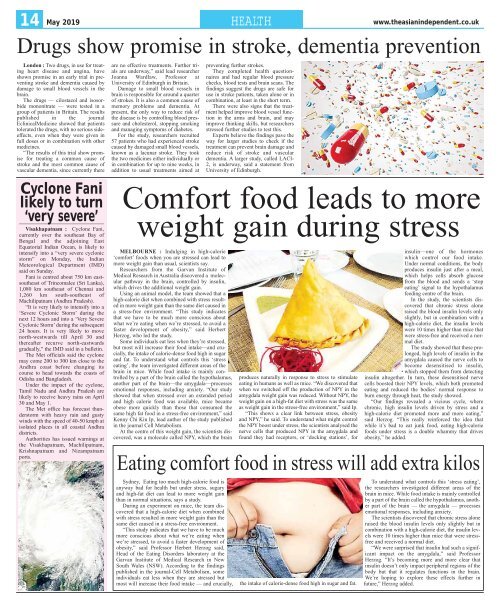Create successful ePaper yourself
Turn your PDF publications into a flip-book with our unique Google optimized e-Paper software.
14 <strong>May</strong> <strong>2019</strong><br />
HEALTH<br />
www.theasianindependent.co.uk<br />
Drugs show promise in stroke, dementia prevention<br />
London : Two drugs, in use for treating<br />
heart disease and angina, have<br />
shown promise in an early trial in preventing<br />
stroke and dementia caused by<br />
damage to small blood vessels in the<br />
brain.<br />
The drugs — cilostazol and isosorbide<br />
mononitrate — were tested in a<br />
group of patients in Britain. The results<br />
published in the journal<br />
EclinicalMedicine showed that patients<br />
tolerated the drugs, with no serious sideeffects,<br />
even when they were given in<br />
full doses or in combination with other<br />
medicines.<br />
“The results of this trial show promise<br />
for treating a common cause of<br />
stroke and the most common cause of<br />
vascular dementia, since currently there<br />
Cyclone Fani<br />
likely to turn<br />
‘very severe’<br />
Visakhapatnam : Cyclone Fani,<br />
currently over the southeast Bay of<br />
Bengal and the adjoining East<br />
Equatorial Indian Ocean, is likely to<br />
intensify into a “very severe cyclonic<br />
storm” on Monday, the Indian<br />
Meteorological Department (IMD)<br />
said on Sunday.<br />
Fani is centred about 750 km eastsoutheast<br />
of Trincomalee (Sri Lanka),<br />
1,080 km southeast of Chennai and<br />
1,260 km south-southeast of<br />
Machilipatnam (Andhra Pradesh).<br />
“It is very likely to intensify into a<br />
‘Severe Cyclonic Storm’ during the<br />
next 12 hours and into a ‘Very Severe<br />
Cyclonic Storm’ during the subsequent<br />
24 hours. It is very likely to move<br />
north-westwards till April 30 and<br />
thereafter recurve north-eastwards<br />
gradually,” the IMD said in a bulletin.<br />
The Met officials said the cyclone<br />
may come 200 to 300 km close to the<br />
Andhra coast before changing its<br />
course to head towards the coasts of<br />
Odisha and Bangladesh.<br />
Under the impact of the cyclone,<br />
Tamil Nadu and Andhra Pradesh are<br />
likely to receive heavy rains on April<br />
30 and <strong>May</strong> 1.<br />
The Met office has forecast thunderstorm<br />
with heavy rain and gusty<br />
winds with the speed of 40-50 kmph at<br />
isolated places in all coastal Andhra<br />
districts.<br />
Authorities has issued warnings at<br />
the Visakhapatnam, Machilipatnam,<br />
Krishnapatnam and Nizampatnam<br />
ports.<br />
are no effective treatments. Further trials<br />
are underway,” said lead researcher<br />
Joanna Wardlaw, Professor at<br />
University of Edinburgh in Britain.<br />
Damage to small blood vessels in<br />
brain is responsible for around a quarter<br />
of strokes. It is also a common cause of<br />
memory problems and dementia. At<br />
present, the only way to reduce risk of<br />
the disease is by controlling blood pressure<br />
and cholesterol, stopping smoking<br />
and managing symptoms of diabetes.<br />
For the study, researchers recruited<br />
57 patients who had experienced stroke<br />
caused by damaged small blood vessels,<br />
known as a lacunar stroke. They took<br />
the two medicines either individually or<br />
in combination for up to nine weeks, in<br />
addition to usual treatments aimed at<br />
MELBOURNE : Indulging in high-calorie<br />
‘comfort’ foods when you are stressed can lead to<br />
more weight gain than usual, scientists say.<br />
Researchers from the Garvan Institute of<br />
Medical Research in Australia discovered a molecular<br />
pathway in the brain, controlled by insulin,<br />
which drives the additional weight gain.<br />
Using an animal model, the team showed that a<br />
high-calorie diet when combined with stress resulted<br />
in more weight gain than the same diet caused in<br />
a stress-free environment. “This study indicates<br />
that we have to be much more conscious about<br />
what we’re eating when we’re stressed, to avoid a<br />
faster development of obesity,” said Herbert<br />
Herzog, who led the study.<br />
Some individuals eat less when they’re stressed,<br />
but most will increase their food intake—and crucially,<br />
the intake of calorie-dense food high in sugar<br />
and fat. To understand what controls this ‘stress<br />
eating’, the team investigated different areas of the<br />
brain in mice. While food intake is mainly controlled<br />
by a part of the brain called the hypothalamus,<br />
another part of the brain—the amygdala—processes<br />
emotional responses, including anxiety. “Our study<br />
showed that when stressed over an extended period<br />
and high calorie food was available, mice became<br />
obese more quickly than those that consumed the<br />
same high fat food in a stress-free environment,” said<br />
Kenny Chi Kin Ip, lead author of the study published<br />
in the journal Cell Metabolism.<br />
At the centre of this weight gain, the scientists discovered,<br />
was a molecule called NPY, which the brain<br />
preventing further strokes.<br />
They completed health questionnaires<br />
and had regular blood pressure<br />
checks, blood tests and brain scans. The<br />
findings suggest the drugs are safe for<br />
use in stroke patients, taken alone or in<br />
combination, at least in the short term.<br />
There were also signs that the treatment<br />
helped improve blood vessel function<br />
in the arms and brain, and may<br />
improve thinking skills, but researchers<br />
stressed further studies to test this.<br />
Experts believe the findings pave the<br />
way for larger studies to check if the<br />
treatment can prevent brain damage and<br />
reduce risk of stroke and vascular<br />
dementia. A larger study, called LACI-<br />
2, is underway, said a statement from<br />
University of Edinburgh.<br />
Comfort food leads to more<br />
weight gain during stress<br />
Sydney, Eating too much high-calorie food is<br />
anyway bad for health but under stress, sugary<br />
and high-fat diet can lead to more weight gain<br />
than in normal situations, says a study.<br />
During an experiment on mice, the team discovered<br />
that a high-calorie diet when combined<br />
with stress resulted in more weight gain than the<br />
same diet caused in a stress-free environment.<br />
“This study indicates that we have to be much<br />
more conscious about what we’re eating when<br />
we’re stressed, to avoid a faster development of<br />
obesity,” said Professor Herbert Herzog said,<br />
Head of the Eating Disorders laboratory at the<br />
Garvan Institute of Medical Research in New<br />
South Wales (NSW). According to the findings<br />
published in the journal-Cell Metabolism, some<br />
individuals eat less when they are stressed but<br />
most will increase their food intake — and crucially,<br />
produces naturally in response to stress to stimulate<br />
eating in humans as well as mice. “We discovered that<br />
when we switched off the production of NPY in the<br />
amygdala weight gain was reduced. Without NPY, the<br />
weight gain on a high-fat diet with stress was the same<br />
as weight gain in the stress-free environment,” said Ip.<br />
“This shows a clear link between stress, obesity<br />
and NPY,” he said. To understand what might control<br />
the NPY boost under stress, the scientists analysed the<br />
nerve cells that produced NPY in the amygdala and<br />
found they had receptors, or ‘docking stations’, for<br />
the intake of calorie-dense food high in sugar and fat.<br />
insulin—one of the hormones<br />
which control our food intake.<br />
Under normal conditions, the body<br />
produces insulin just after a meal,<br />
which helps cells absorb glucose<br />
from the blood and sends a ‘stop<br />
eating’ signal to the hypothalamus<br />
feeding centre of the brain.<br />
In the study, the scientists discovered<br />
that chronic stress alone<br />
raised the blood insulin levels only<br />
slightly, but in combination with a<br />
high-calorie diet, the insulin levels<br />
were 10 times higher than mice that<br />
were stress-free and received a normal<br />
diet.<br />
The study showed that these prolonged,<br />
high levels of insulin in the<br />
amygdala caused the nerve cells to<br />
become desensitised to insulin,<br />
which stopped them from detecting<br />
insulin altogether. In turn, these desensitised nerve<br />
cells boosted their NPY levels, which both promoted<br />
eating and reduced the bodies’ normal response to<br />
burn energy through heat, the study showed.<br />
“Our findings revealed a vicious cycle, where<br />
chronic, high insulin levels driven by stress and a<br />
high-calorie diet promoted more and more eating,”<br />
said Herzog. “This really reinforced the idea that<br />
while it’s bad to eat junk food, eating high-calorie<br />
foods under stress is a double whammy that drives<br />
obesity,” he added.<br />
Eating comfort food in stress will add extra kilos<br />
To understand what controls this ‘stress eating’,<br />
the researchers investigated different areas of the<br />
brain in mice. While food intake is mainly controlled<br />
by a part of the brain called the hypothalamus, another<br />
part of the brain — the amygdala — processes<br />
emotional responses, including anxiety.<br />
The scientists discovered that chronic stress alone<br />
raised the blood insulin levels only slightly but in<br />
combination with a high-calorie diet, the insulin levels<br />
were 10 times higher than mice that were stressfree<br />
and received a normal diet.<br />
“We were surprised that insulin had such a significant<br />
impact on the amygdala,” said Professor<br />
Herzog. “It’s becoming more and more clear that<br />
insulin doesn’t only impact peripheral regions of the<br />
body but that it regulates functions in the brain.<br />
We’re hoping to explore these effects further in<br />
future,” Herzog added.
















